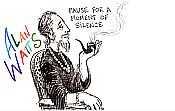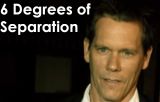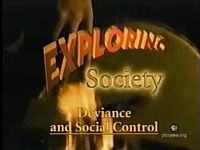INTRO TO SOCIOLOGY - ONLINE MEDIA QUESTIONS
Professor Reymers - Fall 2020
All assignments should be e-mailed to: reymers@morrisville.edu
Online Media SOCI1: The Sociological Imagination

Watch this video about the "sociological imagination" and read these excerpts from C. Wright Mills' original article "The Promise of Sociology," then discuss the questions below in an email to your Professor.
1. What is another personal trouble (other than obesity, as described in the video) that has social factors that contribute?
2. How do social structures contribute to social problems?
3. How does using the sociological imagination help us examine human behavior?
Due on or before Friday, August 28 at 5pm. No late assignments will be accepted.
DO NOT send your answers as an email attachment.
(I recommend copying and pasting the questions into a document (Word, Google, Notepad, etc.) and then answering the questions as you watch; then copy and paste your answers in an email to me).
E-mail your completed answers directly to: reymers@morrisville.edu with the SUBJECT line to read: SOCI1.
Online Media 2: The Baloney Detection Kit

Watch this video about "The Fine Art of Baloney Detection" (by Carl Sagan) and answer the following questions:
1. What is tool #1 in the baloney detection kit? Explain it's purpose.
2. What is tool #2 in the baloney detection kit? Explain it's purpose.
3. What is tool #3 in the baloney detection kit? Explain it's purpose.
4. What is tool #4 in the baloney detection kit? Explain it's purpose.
5. What is tool #5 in the baloney detection kit? Explain it's purpose.
6. What is tool #6 in the baloney detection kit? Explain it's purpose.
7. What is tool #7 in the baloney detection kit? Explain it's purpose.
8. What is tool #8 in the baloney detection kit? Explain it's purpose.
9. What is tool #9 in the baloney detection kit? Explain it's purpose.
Due on or before
Friday, Sept 4 5pm
DO NOT send as attachment.
E-mail your completed answers to: reymers@morrisville.edu with SUBJECT LINE: SOCI2
Online Media 3: The Culture of Fear
"Fear is the mind killer." - Frank Herbert, Dune
Read "The Culture of Fear" by Frank Furedi (Spiked, 2007) and Watch the Interview with the author of the book The Culture of Fear, Barry Glassner (YouTube, 9 min). Then send your answers by email to your professor (see below).
 QUESTIONS on READING:
QUESTIONS on READING:
1. What is the authors argument about how sociologists have dealt with the cultural study of fear in the past and the present?
2. What does sociologist Ann Swidler mean by saying "in
the very act of using culture, people ‘learn how to be, or become, particular kinds of persons’"?
3. What does the author mean by saying that "fear today has a free-floating and raw dynamic"?
4. How can this theory of a "culture of fear" apply to our current society? Find an example in current events that relates.
 QUESTIONS on VIDEO:
QUESTIONS on VIDEO:
5. What are the social institutions and forces that promote a "culture of fear" in our society?
6. What are the problems related to promoting a culture of fear and mistrust in children?
7. Using the same logic as the video narrator (Barry Glassner), discuss how fear leads to a mistrust in social and political institutions in America today.
Due on or before Friday, 9/11 at 5pm.
DO NOT send as an attachment.
E-mail your completed answers to: reymers@morrisville.edu,
with the SUBJECT line to read: SOCI3.
Online Media 4
Social Interaction and Performance

Watch this Crash Course in Sociology video on Social Interaction and Performance (YouTube, 2017, 11:38) and answer the following questions below.
1. How are social interaction and social structure defined?
2. What is social status? Include the difference between ascribed and achieved status. Give three examples from your life.
3. What is a social role and how does it differ from a status?
4. What is the "Thomas Theorem?"
5. What is "impression management" and what are "sign vehicles"?
6. What's the difference between "front stage" and "back stage" performances?
Due on or before Friday, 9/25 at 5pm.
DO NOT send as an attachment.
E-mail your completed answers to: reymers@morrisville.edu,
with the SUBJECT line to read: SOCI4.
Online Media SOCI5: Teaching the Self

Watch this After Skool video featuring the ideas of Alan Watts on the egoistic self as a social construction, then answer these questions:
1. What do you think Watts means by "real silence"?
2. Explain what Watts meant by the statement "Money represents wealth in exactly the same way that the menu represents the meal."
3. Are you the same as your personality, or ego? Is ego-consciousness the only way to think of the self?
4. What is the meaning of life, according to Watts? What do you think he means by that final quote?
Due on or before Friday, 10/2 at 5pm.
DO NOT send as an attachment. E-mail your completed assignment to reymers@morrisville.edu, with the SUBJECT line to read: SOCI5
Online Media 6: Social Networks

Watch this video (46 minutes) and answer the
following questions:
1. What is the meaning of the term "six degrees of separation"?
2. Why were Cornell researchers Strogatz and Watts studying crickets?
3. What is the paradox of "small world problem" and how is it solved?
4. How was actor Kevin Bacon used to study the six degrees of separation?
5. What is a network hub?
6. What are some other examples of small world networks?
7. Who are society's "hubs"?
8. How can the reality of social networks lead to negative outcomes?
9. How can our undertstanding of networks help to ward off these problems?
10. How many of the forty packages made it back to Marc Vidal in Boston and how many connections did they take to get there?
Due on or before Friday, 10/9 at 5pm.
DO NOT send as an attachment. E-mail your completed assignment to reymers@morrisville.edu, with the SUBJECT line to read: SOCI6
Online Media 7: Deviance & Social Control

Watch this video about the sociology of deviance and then answer the following questions:
1. What is a definition of deviance from the video?
2. What is the difference between informal and formal deviance? Give an example of each.
3. Summarize the functionalist perspective on deviance.
4. Summarize the conflict perspective on deviance.
5. Summarize the interactionist perspective on deviance.
6. What are the four primary reasons why we put criminals behind bars? Briefly define each reason.
7. How does having a criminal record affect someone, even after they have "paid their dues"?
8. What is plea bargaining and in what way does it disadvantage the poor?
Due on or before Friday, 10/16 at 5pm.
DO NOT send as an attachment. E-mail your completed assignment to reymers@morrisville.edu, with the SUBJECT line to read: SOCI7
Online Media 8: Rankism and Social Class

Read Online Media 8, Somebodies and Nobodies, then answer the following questions:
1. What is “rankism”? What sociological theories relevantly explain rankism?
2. Is it power differences only that are the cause of rankism? Why or why not?
3. Give several specific examples of rankism, from your own life, if possible.
4. Talk about two potential consequences of rankism.
Due on or before Friday, 10/30 at 5pm.
DO NOT send as an attachment. E-mail your completed assignment to reymers@morrisville.edu, with the SUBJECT line to read: SOCI8
Online Media 9:
DuBois and Race Conflict

Watch Crash Course in Sociology #7: DuBois and Race Conflict and answer the following questions:
1. Who was the first black man to receive a Ph.D. (doctorate degree) from Harvard University, who then went on to found the NAACP?
2. How is race thought of in contemporary sociology?
3. What is the idea of "double consciousness"?
4. What were the radical conclusions of the study presented in "The Philadelphia Negro?"
5. What is "racial formation theory"?
6. What does it mean to say there can be "racism without racists"?
7. Give a specific example of "racial resistance"?
Due on or before Friday, 11/6 at 5pm.
DO NOT send as an attachment. E-mail your completed assignment to reymers@morrisville.edu, SUBJECT line to read: SOCI9
Online Media 10:
Electoral Politics Off the Rail!

Watch Van Jones:
What if a US presidential candidate
refuses to concede after an election? TED, Oct 26, 2020
1. What is the little tradition (custom, or norm) that Jones is talking about that is most important for the health and well-being of our nation?
2. What is the analogy Jones uses to explain the presidential election process, including the popular election process and the elite selection process?
3. Where could the presidential election end up if there is enough legal contention over results and if a losing candidate does not concede an election?
4. How could a candidate perform a "legal coup" in Congress to overturn the popular election vote?
5. What can be done about this possibility of a "legal coup"?
Due on or before Friday, 11/13 at 5pm.
DO NOT send as an attachment. E-mail your completed assignment to reymers@morrisville.edu, SUBJECT line to read: SOCI10
OPTIONAL Online Media B1:
Are We Overpopulated?

VIDEO: Watch The Overpopulation Myth (YouTube, ~50min long), featuring Hans Rosling and answer the following questions:
1. When did human population reach 1 billion people? What is it now? (~3 min)
2. What is happening in Bangladesh with respect to the family institution? (~4 min)
3. What has happened with respect to average number of babies in the world in the past 50 years? (~9 min)
4. What has happened in terms of infant mortality (death of children) over the past 200 years? (~19 min)
5. What will the predicted world population be in 2100? (~21 min)
6. How have hospitals in Mozambique changed in the last 30 years? (~30 min)
7. What is the difference in income from the poorest to richest among the
world population? (~36 min)
8. What percent of adults in the world today are literate? (~43 min)
9. In terms of the proportion of the world in extreme poverty, how has world income distribution changed in the last 50 years? (~ 46 min)
10. What is the energy-related problem with ending the world's extreme poverty? (~52 min)
Due on or before Friday, 11/20 at 5pm
E-mail your completed assignment
to: reymers@morrisville.edu,
with the SUBJECT line to read: SOCIB1
OPTIONAL/BONUS
Online Media B2:
Uncertain Futures
INSTRUCTIONS:
A. Access the main search link to the Library Databases (on the Morrisville College Library website).
B. Use the search terms climate change sociology and youth to find the article titled 'Climate change, uncertain futures and the sociology of youth,' by Rob White (you may need to sign in using your Morrisville account name and password -- it's the same as your email name and password).
C. Click "Available Online" below the title to read, save or print the article.
Answer these questions about the article:
1.What four social conflicts do the authors outline in relation to climate change?
2. Youth identity in relation to climate change, according to the author, will be divided into what two categories of belonging?
3. In what way(s) does the author characterize "survivalism" as a potential path of identity and behavior in a changing world?
4. In what way(s) does the author characterize "activism" as a potential path of identity and behavior in a changing world?
5. How seriously do we or should we take the problem of an uncertain future?
E-mail your completed assignment
to: reymers@morrisville.edu,
with the SUBJECT line to read: SOCIB2
Due on or before Friday, December 4 at 5pm
Administrative Note:
I will give you 3 chances to get the subject heading correct in your online media emails to me. For example, when you sent the first online media assignment, you should have used a subject heading in the email of "SOCI1." If you wrote something else (like, for instance,
"Online Media Questions 1" or "soci 1 hw" or "from Joe Student"), or if you have included your assignment as an attachment, you have not paid attention to the details of the assignment instructions (details which make it crucially easier for me to organize your responses and read what you have written). You can do this three times without penalty, but a fourth instance of not paying attention to the details will result in a 1-point reduction from your Online Media grade. For the vast majority who are doing it right, thank you for paying attention to the details! - Regards, Prof Reymers












